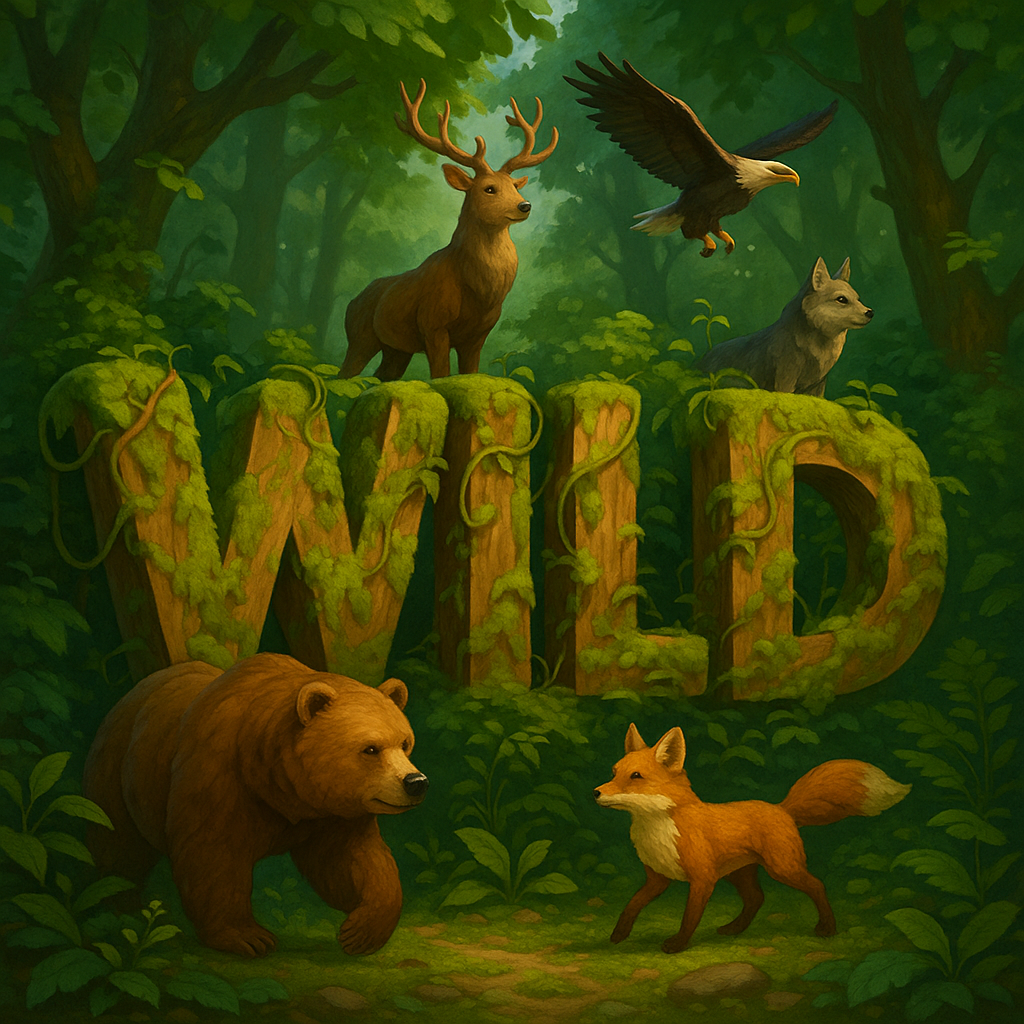Wild
Definition
Wild is an adjective, noun, and adverb. As an adjective, it refers to something untamed, uncontrolled, or natural. As a noun, it describes an uncultivated or uninhabited area. As an adverb, it means in an uncontrolled or unrestrained manner.
Parts of Speech
- Adjective
- Noun
- Adverb
Pronunciation
American English
- IPA Pronunciation: /waɪld/
- Respelling: WYLD
British English
- IPA Pronunciation: /waɪld/
- Respelling: WYLD
Etymology
The word "wild" originates from Old English "wilde," meaning "living in a natural state," derived from Proto-Germanic "*wilthijaz," meaning "untamed" or "uncontrolled." It is related to Old High German "wildi" and Old Norse "villr."
Derivatives
- Wildly (adverb)
- Wildness (noun)
- Wilding (noun)
- Wildlife (noun)
- Wildflower (noun)
Synonyms
- Untamed
- Natural
- Feral
Antonyms
- Domestic
- Cultivated
- Tame
Usage
The word "wild" is used in various contexts. As an adjective: "The wild horse ran freely across the plains." As a noun: "The adventurers trekked through the wild." As an adverb: "The crowd cheered wildly during the performance."
Related Terms
- Untamed: Not domesticated or controlled.
- Feral: Existing in a wild or untamed state.
- Natural: Existing without human intervention.
Detailed Definitions
Adjective
- Living or growing in a natural state: Refers to plants, animals, or areas not influenced by humans.
- Example: "The forest is home to many wild animals."
- Uncontrolled or unpredictable: Refers to chaotic or unruly behavior.
- Example: "The party got wild as the night progressed."
- Exciting or unusual: Refers to extraordinary or unexpected events.
- Example: "It was a wild idea, but it worked!"
Noun
- A natural or uncultivated area: Describes places untouched by human development.
- Example: "The explorers ventured deep into the wild."
Adverb
- In an uncontrolled or unrestrained manner: Refers to actions performed with intensity or chaos.
- Example: "The children ran wild in the playground."
wild



🇨🇳 Mandarin
- 野生 (Wild, in the sense of animals or plants)
- IPA: /jɛ ʂɤŋ/
- English Respell: Yěshēng
- 狂野 (Wild, in the sense of behavior)
- IPA: /kʰwɑŋ jɛ/
- English Respell: Kuángyě
🇮🇳 Hindi
- जंगली (Wild, in the sense of animals or plants)
- IPA: /dʒʌŋgliː/
- English Respell: Jangli
- बेतहाशा (Wild, in the sense of behavior)
- IPA: /beːtəhaːʃaː/
- English Respell: Betahasha
🇪🇸 Spanish
- Salvaje (Wild, in the sense of animals or plants)
- IPA: /salˈβaxe/
- English Respell: Salvaje
- Desenfrenado (Wild, in the sense of behavior)
- IPA: /desenfɾeˈnado/
- English Respell: Desenfrenado
🇫🇷 French
- Sauvage (Wild, in the sense of animals or plants)
- IPA: /sovaʒ/
- English Respell: Sauvage
- Fou (Wild, in the sense of behavior)
- IPA: /fu/
- English Respell: Fou
🇸🇦 Modern Standard Arabic
- بري (Wild, in the sense of animals or plants)
- IPA: /bɑriː/
- English Respell: Barii
- مجنون (Wild, in the sense of behavior)
- IPA: /madʒnuːn/
- English Respell: Majnoon
🇧🇩 Bengali
- বন্য (Wild, in the sense of animals or plants)
- IPA: /bɔnjo/
- English Respell: Bonjo
- অমিয়া (Wild, in the sense of behavior)
- IPA: /ɔmidʒa/
- English Respell: Omiyaa
🇷🇺 Russian
- Дикий (Wild, in the sense of animals or plants)
- IPA: /ˈdʲikʲɪj/
- English Respell: Dikiy
- Безудержный (Wild, in the sense of behavior)
- IPA: /bʲɪzʊˈdʲerʐnɨj/
- English Respell: Bezuderzhny
🇵🇹 Portuguese
- Selvagem (Wild, in the sense of animals or plants)
- IPA: /sɛlˈvaʒẽj/
- English Respell: Selvagem
- Louco (Wild, in the sense of behavior)
- IPA: /ˈlowku/
- English Respell: Louco
🇮🇩 Indonesian
- Liar (Wild, in the sense of animals or plants)
- IPA: /liar/
- English Respell: Liar
- Gila (Wild, in the sense of behavior)
- IPA: /gila/
- English Respell: Gila
🇩🇪 German
- Wild (Wild, in the sense of animals or plants)
- IPA: /vɪlt/
- English Respell: Vilt
- Wild (Wild, in the sense of behavior)
- IPA: /vɪlt/
- English Respell: Vilt
🇯🇵 Japanese
- 野生 (Wild, in the sense of animals or plants)
- IPA: /jaseː/
- English Respell: Yasei
- 乱暴 (Wild, in the sense of behavior)
- IPA: /raŋboː/
- English Respell: Ranbou
🇻🇳 Vietnamese
- Hoang dã (Wild, in the sense of animals or plants)
- IPA: /hwang zaː/
- English Respell: Hoang da
- Dữ dội (Wild, in the sense of behavior)
- IPA: /zɨ ɗɔjˀ/
- English Respell: Du doi
🇰🇷 Korean
- 야생의 (Wild, in the sense of animals or plants)
- IPA: /ja.sɛŋ.ɯi/
- English Respell: Yasaengui
- 난폭한 (Wild, in the sense of behavior)
- IPA: /nan.pʰok̚.han/
- English Respell: Nanpokhan
🇹🇷 Turkish
- Yaban (Wild, in the sense of animals or plants)
- IPA: /jaˈban/
- English Respell: Yaban
- Çılgın (Wild, in the sense of behavior)
- IPA: /tʃɯlˈɟɯn/
- English Respell: Çılgın
🇵🇰 Urdu
- جنگلی (Wild, in the sense of animals or plants)
- IPA: /d͡ʒəŋɡliː/
- English Respell: Jangli
- بے بہودہ (Wild, in the sense of behavior)
- IPA: /beː bɛˈhoːdaː/
- English Respell: Be-Behooda





